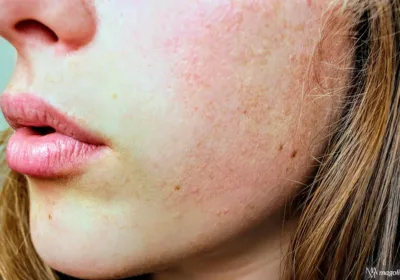Got Sensitive Skin? Here’s Your Care Guide

Sensitive skin care is extremely important as it requires a delicate balance of the right products and care. Your regime starts with routines and rules that are tailored to your skin condition. To help you, we have created this simple guide for sensitive skin care.
What Is Sensitive Skin Care?
Having sensitive skin means that your skin reacts more intensely to various products and treatments that people with other skin types may tolerate better. This reaction can present itself as burning sensations, itching, dryness, or redness.
Triggers for skin sensitivity can include food intake, certain ingredients in products, or even environmental factors. The point is, sensitive skin does not originate from one singular cause. Instead, the underlying causes of sensitive skin varies greatly from person to person. And ranges from external irritants to genetic factors. So, recognizing your skin’s sensitivities is the first step towards finding a care routine that keeps your skin feeling soothed and calm.
Also, symptoms such as redness and dryness can also be an indication of rosacea. Please see our professionals to consider this diagnosis if your have redness that does not subside despite trying different treatments.
For the most part, our recommendation for sensitive skin care includes:
- Gently cleanse with a mild, soap-free cleanser
- Apply a moisturizer formulated for sensitive skin
- Free your skin from irritation with soft, breathable fabric
- Protect your skin from sun damage
Rules To Follow
Following a few simple rules when managing sensitive skin can make a notable difference in your skin’s appearance and health.
1. Knowing Your Triggers
The first step in managing sensitive skin is understanding your triggers so that you can avoid them. If your skin is experiencing discomfort, review your day to ascertain what you might have eaten or used during the day. It’s also helpful to consider whether you have encountered any common irritants like allergenic foods, certain fabrics, and harsh weather conditions. Or even stressful situations.
Although this rule may take some time to experiment, it’s also helpful in preventing additional discomfort if your skin is sensitive. So, pay close attention to what might have caused it and when your skin reacts. By doing this, you can start to remove potential triggers from your lifestyle and environment.
2. Read Product Information Before Using
Whether skincare products or other types of products, always read the labels before using them. Always look for products labeled ‘fragrance-free’, ‘for sensitive skin’, or ‘hypoallergenic’. These types of products are generally formulated for use on those with sensitive skin. And ingredients you should avoid are fragrances, certain preservatives, and alcohol.
3. Create a Care Routine
The key to managing sensitive skin is using a gentle, consistent routine. Below are steps to follow when caring for sensitive skin.
Cleansing. Opt for a soap-free, mild cleanser that doesn’t strip your skin of its natural oils. You should also use lukewarm water as opposed to hot water, which can exacerbate skin sensitivity. After cleansing, don’t rub your face dry, instead gently pat to remove the excess water.
Moisturizing. Moisturizers reduce sensitivity to irritants by strengthening your skin’s barrier. Look for moisturizers with soothing ingredients like ceramides, glycerine, and hyaluronic acid.
To lock in hydration, apply moisturizer while your skin is still damp. Also, look for labels like ‘tested on sensitive skin’, and make sure the product is free of lanolin, alcohol, colorants, and fragrances.
Sun Protection. Because sensitive skin is more susceptible to sun damage, consider using a broad spectrum sunscreen with an SPF of at least 30. If you prefer mineral sunscreens, look for one that contains titanium dioxide or zinc oxide. Regardless which type you choose, don’t forget to reapply sunscreen every two hours to ensure its effectiveness.
Diet + Hydration. A diet rich in omega-3 fatty acids and antioxidants can support skin health. Ensuring that you stay well-hydrated is also essential for maintaining skin’s moisture balance. So, aim for drinking at least 2 liters of water daily.
Fabrics. To minimize skin irritation, opt for clothes and fabrics that are soft and breathable like cotton. Avoiding synthetic materials can help you avoid friction, which also aggravates skin sensitivity.
Skincare For Sensitive Skin by Magnolia Medical & Aesthetics
While sensitive skin can often disrupt our lives, you no longer need to live with it. Our experienced, highly trained professionals are adept in helping patients take good care of their skin with treatments tailored to your skin care needs.
Request an Appointment at Magnolia Medical & Aesthetics
Book online or call (210) 600-3335 to learn more about our sensitive skin care treatments and products.



